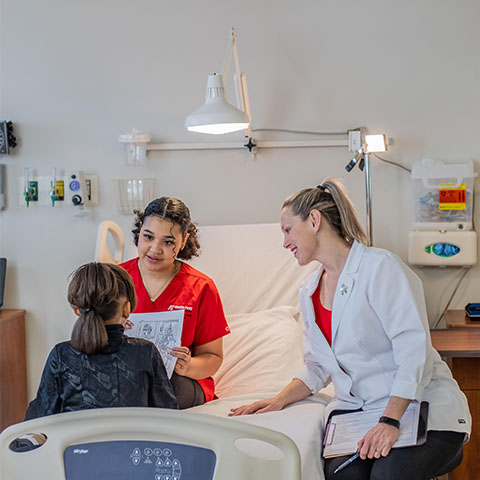Why study Communication Sciences and Disorders
The Communication Sciences and Disorders curriculum is designed to prepare students for graduate study. The curriculum prepares students for clinical work with people of all ages who present with a variety of speech, language, cognitive, and hearing impairments by emphasizing the acquisition of foundational knowledge, skills, and attitudes.
Undergraduates who value people and want to help others establish or maintain their social and vocational roles, such as mother; father; grandfather; husband; wife; sister; brother; best friend; soldier; teacher; scientist; hostess; mailman; and cashier, will appreciate the study of communication sciences and disorders.
Human communication is a fundamental skill that is at the core of all relationships and opportunities to learn. If you have a desire to help others and really make a difference you will enjoy discovering how the brain works to help us communicate, learn, and swallow. Undergraduate students in Communication Sciences and Disorders will build their knowledge of human communication through coursework, hands-on learning, and observation. The curriculum provides a holistic perspective of communication exposing students to normal and disordered aspects of speech, language, and hearing in people of all ages. The program includes a clinical experience through the APSU Speech-Language & Swallowing Community Clinic. Read more here about the value of an undergraduate degree in Communication Sciences and Disorders: https://www.asha.org/academic/value-of-the-undergraduatedegree-%20in-csd/.
The faculty are highly qualified practitioners and educators. Dr. Kleinhans has extensive experience evaluating and treating neurogenic communication and swallowing disorders. She also conducts research in clinical education to enhance student training. Dr. Bancroft is an expert in evidence-based coaching in early intervention. Her research focus is to empower families and other caregivers to facilitate play and language with their young child.
What will I learn
- Basic Sciences and processes related to communication, cognition, hearing and swallowing.
- Etiologies and characteristics of communication disorders.
- Understanding of how individual, cultural and linguistic differences are expressed in communication.
- How to apply critical thinking and problem-solving skills to topics in communications sciences.
- Undergraduates will learn how we communicate using speech and language, nonverbal forms of communication and alternative forms of communication.
- Students will learn the underlying anatomy and physiology of speech and hearing and even how we use these structures for swallowing to maintain adequate nutrition and hydration.
- Strong core basic science undergraduates will learn characteristics and etiologies of a variety of communication disorders.
- Most importantly, students will learn about the people who experience communication disorders and the impact on functioning in everyday life.
Program Information
Communication Sciences and Disorders Program Requirements
Communication Sciences and Disorders, BS HHP Sample 4 Year Plan
